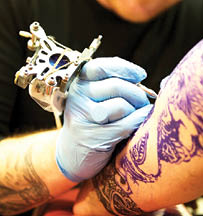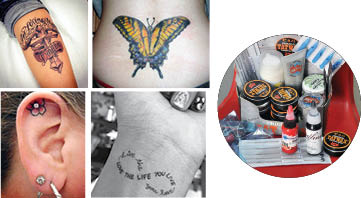
Body art and piercings are a popular form of self-expression in today’s world – increasingly one of individualism and ‘show’. On the road, in coffee shops and in campuses, more than a few youngsters (and some more young-at-heart) can be seen flaunting their ‘skin art’. The pierced form is permanent. Welcome to the world of Tattoos. However, before you get a puncture, do care, if not beware. The first question you should have is whether a tattoo would harm your skin…or more. The process does involve needles and ink. The tattoo itself, once ‘healed’, is not bad for your skin. The problem is when complications arise during the healing process. A tattoo is essentially a series of punctures by which dye is inserted into different levels of the skin - so it is by nature an invasive process. When done correctly and in a sterile environment, there really are no complications, though there may be discomfort due to bleeding or pain. However, it's important to keep potential complications in mind. One potential risk is that of a bacterial infection at the tattoo site. Symptoms of this include redness, warmth and a pus-like drainage. You may also have a ‘reaction’ to the tattoo, in which bumps called ‘granulomas’, or excessive scarring, may appear. Some people may have a serious allergic reaction to the types of dyes used in tattoos. So it's important to leave the tattoo parlour with a list of the types of dyes used, just in case. A more serious risk is the spread of infectious disease, which can be avoided by being particular about the tattoo parlour you use. Diseases such as Hepatitis B, Hepatitis C, Tuberculosis, Tetanus or HIV can spread if a tattoo ‘artist’ uses ‘dirty’ equipment. Therefore, before you get your tattoo, make sure that the parlour uses an autoclave, or a heat sterilisation machine, on all non-disposable equipment. Needles and tubes should be removed from sterile, new packages before every tattoo job.Satty, owner of Angel Tattoo Design Studio, says, “Tattoos are in vogue and people like to ornate themselves for various reasons. The youth are quite crazy about tattoos, and sometimes they come up with creative, innovative thoughts that they want ‘applied’ on their bodies. Some want to impress their spouses by tattooing their (spouses) names. Most youngsters have been inspired to tattoo by their Bollywood and Hollywood favourites. So, in the last five years the tattooing industry has grown well and people have started appreciating the work. Nowadays every tattoo studio ensures the safety of its customers. The needles are disposable and we destroy these in front of customers.” Satty admits that earlier the needles would be repeatedly used by ‘sterilising’ them, and so there was a chance of infection. “We now open the kit in front of the customer. The dates are mentioned on every needle packet. Moreover, we use advanced machines for tattooing. The inks that we use are like glucose; they are not harmful to the body.” Tattoo inks are made up of organic pigments. Archana works with a permanent tattoo art studio and is very passionate about her work. “You have to be creative in this field. As of now there are no degree courses on this subject, but in future there will be some,” she says. “In India, people want to really flaunt their tattoos, and so most of them are only on the visible parts of the body (like wrists, fingers, knees, arms and the lower back) - though a few do prefer full body tattoos. However, schoolgirls usually prefer tattoos on their backs or ankles, so that they can easily hide them during school hours. Even children are getting tattoos done for special occasions, though for them we use the airbrush method. With this the impressions are temporary and can easily be removed. Permanent tattoos need laser therapy” she adds. Ekta is very fond of tattoos. She has a couple of them on her body, including one with her husband’s name. She is quite ok if her children want to follow suit. Her confidence flows from the use of new technology that, according to her, reduces the risks of infection. “The machines that are used now also do not hurt that much,” she says. Ekta says that she has been sporting the tattoos for the last two years and hasn’t faced any health issues. A few girls at Sector 14 Government College are perhaps willing to try it out, but are concerned that the ‘impressions’ would stay with them for the rest of their lives. Besides, they believe that once they start fading, the tattoos are not a pretty sight. Several other youth interviewed by FG liked the idea of tattoos, describing them as fashionable and trendy.

Despite all the warnings and taboos in certain social circles, a majority of those with tattoos have no regrets, and many of those contemplating tattoos seem to have no qualms. Their joy clearly overshadows their worry, or the risk. And as long as the tattoo facility and tattoo artist follow all the necessary sterilisation and autoclaving sanitation procedures, the risk for infection and disease should be relatively low. However, tattoos can also be termed as permanent cosmetic procedures, and should therefore not be taken lightly. ”As with plastic surgery, the results of these procedures will become a part of you,” says Dr. Neeraj Mehta a Dermatologist at the Civil Hospital. “Even with modern tattoo removal technology, your skin will never look the same – scar tissue takes the place of the ‘removed’ ink,” he avers. Sometimes keloid formation takes place at the site, which then turns into a scar. That is why it's also important that those who wear tattoos on their bodies should properly clean and care for them while they are healing. Dr. Mehta adds that tattoos should be attempted only in a very hygienic environment. “Since our human skin is very sensitive, any chemical can harm it and lead to disease. That is also why there is a minimum three months ‘resting period’ before a tattooed person can donate blood. Therefore, before getting a tattoo, it is important that you weigh the medical as well as personal and professional implications – both positive and negative. Despite technological advances in laser surgery, it is very difficult to get rid of a tattoo completely…it will leave a trace. It will become a permanent piece of your skin. You may be left with an image (though faint) that you might not want to live with for all time. Therein may lie the greater pain.
While the debate on tattoos and their effect on health continues to draw diverse opinions, it may be worth our while to look at some of the research that is going on around the globe - trying to get answers to some fundamental questions. For example, there had been no systematic study on the safety of tattoo inks. Now research in the US is being carried out at FDA's Arkansas-based National Center for Toxicological Research (NCTR), to investigate tattoo inks to find out: their chemical composition and how they break down (metabolise) in the body; the short-term and long-term safety of the pigments used in tattoo inks; and how the body responds to the interaction of light with the inks. Some tattoos fade over time or fade when they are exposed to sunlight (which is why laser light is used to remove tattoos). The researchers are trying to find out what happens to the ink or where does the pigment go. The body cells may be digesting and destroying the ink, just as they rid the body of bacteria and other foreign matter, as a defense against infection. NCTR studies show that a common pigment used in yellow tattoo inks, Pigment Yellow 74, may be being broken down by enzymes, or metabolised. Sunlight may also cause the ink to break down so that it is less visible. NCTR researchers have found that Pigment Yellow 74 decomposes in sunlight, breaking down into components that are colourless. However, the pigment components may still remain and may be potentially toxic. Skin cells containing the ink may also be killed by sunlight or laser light and the ink components may disperse throughout the body. Research has also shown that some pigments migrate from the tattoo site to the body's lymph nodes (which help filter out disease-causing organisms). Bottom line: whether the migration of tattoo ink has health consequences or not is still unknown.
Read More...